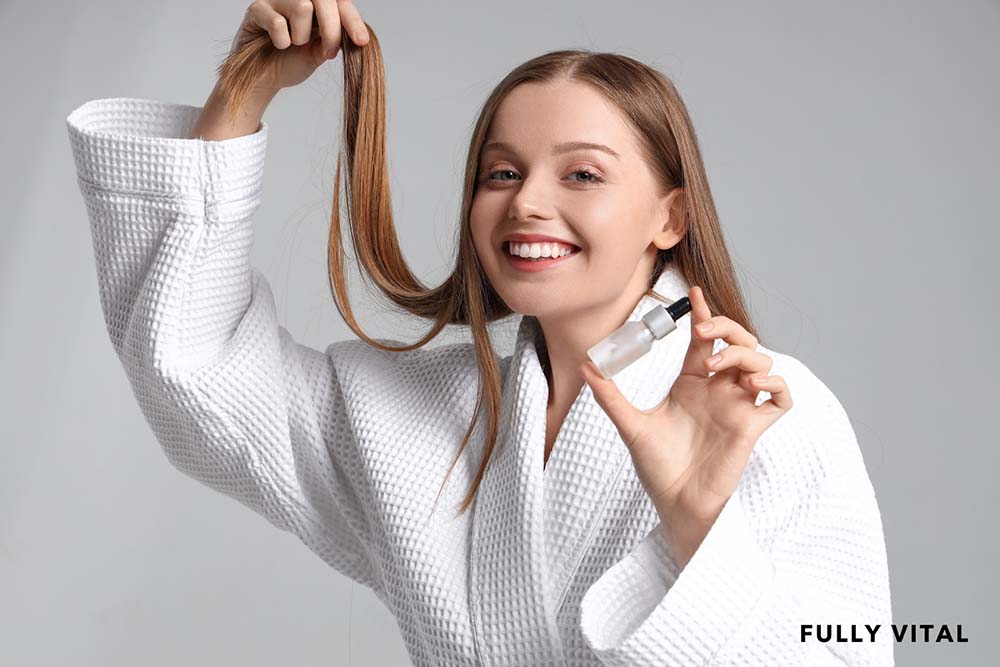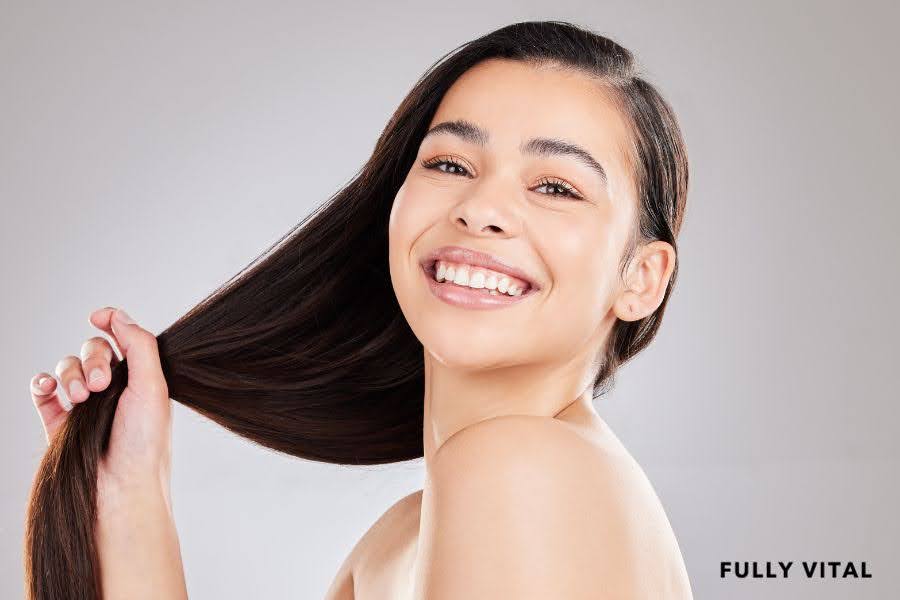
Butylene Glycol: Importance In Haircare
When it comes to combating hair loss and graying hair, women are constantly searching for effective solutions.
One ingredient that has gained significant attention in the realm of hair care is butylene glycol.
In this article, we will delve into the properties, benefits, alternatives, historical uses, and frequently asked questions surrounding butylene glycol.
By understanding its role in promoting hair regrowth, we can make informed decisions about incorporating it into our hair care routine.

I LOVE MY HAIR NOW
FullyVital hair serum and hair vitamins made tremendous improvements in my hair. I truly love my hair now.
Meg S.,
What is Butylene Glycol?
Butylene glycol is a clear, odorless, and water-soluble organic compound.
It belongs to the family of glycols and is commonly used in cosmetic and personal care products.
Its versatile nature allows it to act as a solvent, humectant, and conditioning agent in various formulations, including hair care products.

Why is Butylene Glycol Important?
Butylene glycol plays a crucial role in hair care products due to its unique properties.
It helps improve the absorption of other active ingredients, making them more effective. Additionally, it acts as a humectant, attracting and retaining moisture, thereby promoting hydration in the hair and scalp.
This ingredient also enhances the spreadability and texture of products, ensuring even distribution on the hair strands.
What are the Benefits of Butylene Glycol?
Moisture Retention
Butylene glycol's humectant properties help lock in moisture, preventing dryness and promoting healthier hair.
Enhanced Absorption
By facilitating the penetration of active ingredients, butylene glycol allows for better absorption of nutrients that nourish the scalp and hair follicles.
Conditioning Effect
Butylene glycol can soften and smoothen the hair, making it more manageable and reducing frizz.
Compatibility
It is generally well-tolerated by most individuals, making it suitable for a wide range of hair types, including sensitive scalps.
What are Alternatives to Butylene Glycol?
While butylene glycol offers numerous benefits, some individuals may prefer to avoid it due to personal preferences or sensitivities.
Fortunately, there are alternative ingredients available in the market that can serve similar purposes.
Glycerin, propylene glycol, and sorbitol are commonly used alternatives that possess humectant properties and aid in moisture retention.
It is advisable to consult with a dermatologist or hair care specialist to determine the most suitable alternative based on individual needs and sensitivities.
How has Butylene Glycol been Used Historically?
Butylene glycol has a rich history in the cosmetic and personal care industry.
Its usage can be traced back to the mid-20th century when it was primarily employed in the manufacturing of plastics, rubber, and textile fibers due to its versatile properties.
Over time, its benefits and compatibility with the human body were recognized, leading to its inclusion in various cosmetic products, including hair care formulations.
The historical use of butylene glycol demonstrates its long-standing presence and the confidence placed in its efficacy.
What is the Current Environment of Butylene Glycol?
In the present-day hair care industry, butylene glycol continues to hold a prominent position as an important ingredient for hair regrowth.
It is widely used in various hair care products due to its moisturizing, conditioning, and absorption-enhancing properties.
The current environment highlights the trust and reliance placed on butylene glycol as a valuable component in combating hair loss, promoting healthy hair, and addressing concerns related to graying hair.
What is the Future of Butylene Glycol?
As advancements in cosmetic science and technology continue to unfold, the future of butylene glycol appears promising.
Ongoing research and development efforts aim to explore its potential applications further and optimize its effectiveness in hair regrowth and combating grey hair.
Scientists and formulators are continually seeking innovative ways to harness its properties and combine it with other complementary ingredients to create even more effective hair care solutions.(1)
With a growing focus on sustainability and natural alternatives, the future may also see the emergence of eco-friendly and bio-derived variations of butylene glycol, catering to evolving consumer preferences.
What is the Importance of Butylene Glycol for Hair Regrowth?
Butylene glycol's importance in the context of hair regrowth is evident through its historical usage, current prominence in the hair care industry, and the potential it holds for future advancements.
Its moisturizing and conditioning properties, along with its ability to improve absorption, make it a valuable ingredient in combatting hair loss and promoting healthier hair.
Despite being a synthetic compound, butylene glycol has undergone rigorous safety evaluations, providing confidence in its use.
By leveraging its benefits and staying abreast of ongoing research, individuals seeking effective hair regrowth solutions can consider incorporating butylene glycol into their hair care routines with informed decision-making and an understanding of its role in achieving optimal results.(2)
Is Butylene Glycol Good or Bad for You?
Butylene glycol is generally considered safe for use in cosmetic and personal care products.
Extensive research and regulatory bodies such as the Food and Drug Administration (FDA) and the Cosmetic Ingredient Review (CIR) have evaluated its safety profile.
When used in appropriate concentrations, butylene glycol poses no significant health risks.
However, it is always advisable to perform a patch test before using a new product to check for any personal sensitivities or allergies.(3)
Does Butylene Glycol Dry Hair?
No, butylene glycol does not dry out the hair.
In fact, it has moisturizing properties that help to retain moisture and improve hydration levels in the hair and scalp.
By attracting and retaining moisture, butylene glycol can actually contribute to healthier and more hydrated hair, making it an advantageous ingredient in hair care products.
What Are the Cons of Butylene Glycol?
While butylene glycol is generally considered safe, it's essential to be aware of potential cons or drawbacks.
Some individuals may be sensitive or allergic to butylene glycol, experiencing mild irritation or redness when using products containing this ingredient.
If you have known sensitivities, it is advisable to perform a patch test or consult with a dermatologist before using products that contain butylene glycol.
What Does Butylene Glycol Contain?
Butylene glycol is an organic compound that consists of carbon, hydrogen, and oxygen atoms.
It is derived from petroleum or manufactured synthetically.
The manufacturing process involves the reaction of propylene oxide with ethylene glycol, resulting in the formation of butylene glycol.
The final product is a clear, odorless liquid.
Is Butylene Glycol Natural or Synthetic?
Butylene glycol is a synthetic compound.
It is derived from petroleum or manufactured synthetically in a laboratory.
Although it is not naturally derived, it has been widely used in the cosmetic industry for its beneficial properties and has undergone extensive safety evaluations.
If you prefer natural alternatives, there are options available, such as plant-derived humectants like aloe vera gel or vegetable glycerin.
However, it's important to note that the natural or synthetic origin of an ingredient does not necessarily determine its effectiveness or safety.
Reclaim Your Hair's Vitality with Fully Vital's Powerful Vegan Hair Regrowth System
Unleash the potential of your hair with Fully Vital's Powerful Vegan Hair Regrowth System. Take the first step towards luscious, revitalized hair today! |
Final Thoughts on Butylene Glycol
In conclusion, butylene glycol emerges as a significant ingredient in the realm of hair regrowth and combating gray hair.
Its moisturizing, conditioning, and absorption-enhancing properties make it an important component in various hair care products.
As we explored its history, current relevance, and future potential, it became evident that butylene glycol plays a vital role in promoting healthier, revitalized hair.
At Fully Vital, we understand the importance of effective solutions for hair regrowth.
That's why we have developed a Powerful Vegan Hair Regrowth System for Women that harnesses the benefits of butylene glycol in four different ways.
Our scientifically formulated system stimulates hair growth, nourishes the scalp, strengthens the hair follicles, and improves the overall health of your hair.
With just two minutes of use per day, our product is designed to fit seamlessly into your hair care routine.
We believe in the efficacy of our Vegan Hair Regrowth system so strongly that we offer a 120-day money-back guarantee.
We are confident that you will see positive results and experience the transformative power of our product.
Take the first step towards healthier, fuller hair by incorporating the power of butylene glycol with Fully Vital's Powerful Vegan Hair Regrowth system for Women.
Embrace the opportunity to regain confidence and achieve the vibrant, beautiful hair you desire.
Place your order today and embark on a journey towards hair regrowth and revitalization.
Frequently Asked Questions About Butylene Glycol
Can butylene glycol cause hair loss?
No, there is no scientific evidence suggesting that butylene glycol directly causes hair loss.
In fact, its moisturizing properties can help improve the condition of the scalp and hair.
Is butylene glycol safe for sensitive scalps?
Butylene glycol is generally well-tolerated, even by individuals with sensitive scalps.
However, it is always advisable to perform a patch test before using a product containing this ingredient, especially if you have known sensitivities.
Are there any natural alternatives to butylene glycol?
Yes, if you prefer natural alternatives, ingredients like aloe vera gel, vegetable glycerin, and hyaluronic acid can provide similar moisturizing and humectant properties.
Can butylene glycol be used on color-treated hair?
Yes, butylene glycol is considered safe for use on color-treated hair.
However, it's always recommended to check the product labels or consult with a professional to ensure compatibility with your specific hair dye or treatment.
Is butylene glycol comedogenic?
No, butylene glycol is considered non-comedogenic, meaning it does not clog pores.
It has a low likelihood of causing acne or exacerbating existing breakouts, making it suitable for use in skincare and hair care products for individuals with acne-prone or sensitive skin.
Can butylene glycol cause allergies?
While allergies to butylene glycol are rare, some individuals may experience sensitivity or allergic reactions.
If you have a known allergy to butylene glycol or have experienced adverse reactions in the past, it is advisable to avoid products containing this ingredient or perform a patch test before use.
Does butylene glycol contain any harmful impurities?
High-quality commercial-grade butylene glycol undergoes purification processes to remove impurities.
However, it's important to source products from reputable brands that adhere to strict quality control standards to ensure purity and safety.
Is butylene glycol safe for sensitive skin?
Butylene glycol is generally considered safe for sensitive skin.
It is a well-tolerated ingredient that is often used in products formulated for individuals with sensitive or reactive skin.
However, as with any new product, it is recommended to perform a patch test on a small area of your skin to check for any adverse reactions.
Can butylene glycol be used during pregnancy or while breastfeeding?
The use of butylene glycol during pregnancy or while breastfeeding is generally considered safe.
However, it is always advisable to consult with a healthcare professional before introducing new products into your routine, especially during pregnancy or while breastfeeding, to ensure the safety and well-being of both you and your baby.
Sources:
- Wall, D., Meah, N., Fagan, N., York, K., & Sinclair, R. (2022). Advances in hair growth. Faculty Reviews, 11. https://doi.org/10.12703/r/11-1







